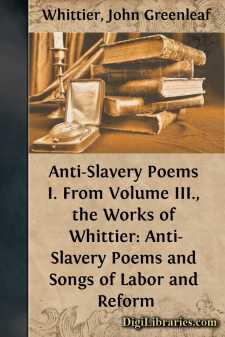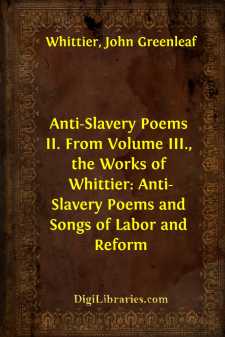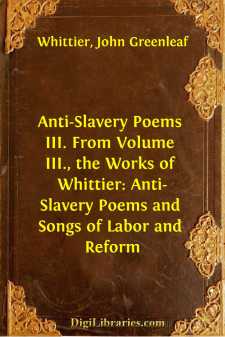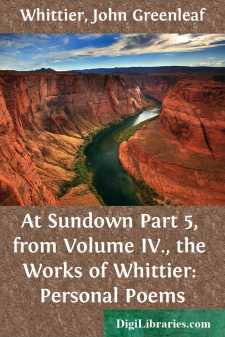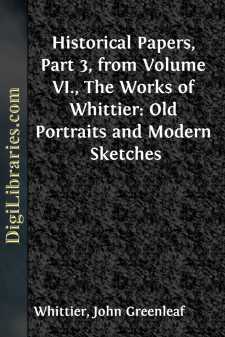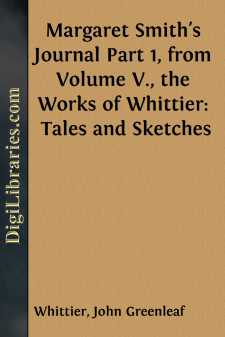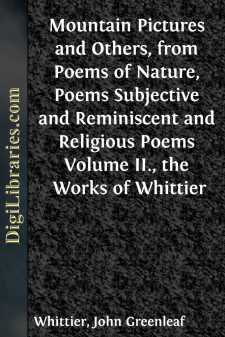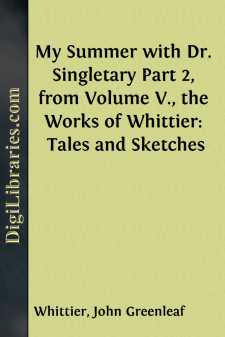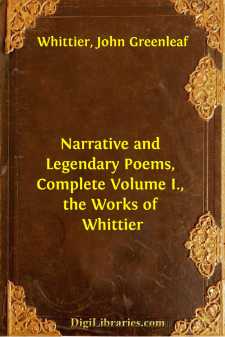Categories
- Antiques & Collectibles 13
- Architecture 36
- Art 48
- Bibles 22
- Biography & Autobiography 813
- Body, Mind & Spirit 142
- Business & Economics 28
- Children's Books 14
- Children's Fiction 11
- Computers 4
- Cooking 94
- Crafts & Hobbies 4
- Drama 346
- Education 46
- Family & Relationships 57
- Fiction 11829
- Games 19
- Gardening 17
- Health & Fitness 34
- History 1377
- House & Home 1
- Humor 147
- Juvenile Fiction 1873
- Juvenile Nonfiction 202
- Language Arts & Disciplines 88
- Law 16
- Literary Collections 686
- Literary Criticism 179
- Mathematics 13
- Medical 41
- Music 40
- Nature 179
- Non-Classifiable 1768
- Performing Arts 7
- Periodicals 1453
- Philosophy 64
- Photography 2
- Poetry 896
- Political Science 203
- Psychology 42
- Reference 154
- Religion 513
- Science 126
- Self-Help 84
- Social Science 81
- Sports & Recreation 34
- Study Aids 3
- Technology & Engineering 59
- Transportation 23
- Travel 463
- True Crime 29
John Greenleaf Whittier
John Greenleaf Whittier was a prominent 19th-century American poet and abolitionist known for his advocacy against slavery through both his literary works and political activism. Born in 1807 in Haverhill, Massachusetts, he was a key figure in the American literary movement and a founding member of the American Anti-Slavery Society. His best-known works include the poem "Snow-Bound," which nostalgically reflects on rural life and family, earning him widespread acclaim.
Author's Books:
Sort by:
ANTI-SLAVERY POEMS ………. TO WILLIAM LLOYD GARRISON CHAMPION of those who groan beneathOppression's iron handIn view of penury, hate, and death,I see thee fearless stand.Still bearing up thy lofty brow,In the steadfast strength of truth,In manhood sealing well the vowAnd promise of thy youth. Go on, for thou hast chosen well;On in the strength of God!Long as one human heart shall swellBeneath...
more...
TEXAS VOICE OF NEW ENGLAND. The five poems immediately following indicate the intense feeling of the friends of freedom in view of the annexation of Texas, with its vast territory sufficient, as was boasted, for six new slave States. Up the hillside, down the glen,Rouse the sleeping citizen;Summon out the might of men! Like a lion growling low,Like a night-storm rising slow,Like the tread of unseen...
more...
DERNE. The storming of the city of Derne, in 1805, by General Eaton, at the head of nine Americans, forty Greeks, and a motley array of Turks and Arabs, was one of those feats of hardihood and daring which have in all ages attracted the admiration of the multitude. The higher and holier heroism of Christian self-denial and sacrifice, in the humble walks of private duty, is seldom so well appreciated....
more...
AT SUNDOWN TO E. C. S. Poet and friend of poets, if thy glassDetects no flower in winter's tuft of grass,Let this slight token of the debt I oweOutlive for thee December's frozen day,And, like the arbutus budding under snow,Take bloom and fragrance from some morn of MayWhen he who gives it shall have gone the wayWhere faith shall see and reverent trust shall know. THE CHRISTMAS OF 1888. Low...
more...
CRITICISM EVANGELINE A review of Mr. Longfellow's poem. EUREKA! Here, then, we have it at last,—an American poem, with the lack of which British reviewers have so long reproached us. Selecting the subject of all others best calculated for his purpose,—the expulsion of the French settlers of Acadie from their quiet and pleasant homes around the Basin of Minas, one of the most sadly romantic...
more...
Perhaps the most unlucky portion of the unlucky speech of Henry Clay on the slavery question is that in which an attempt is made to hold up to scorn and contempt the great Liberator of Ireland. We say an attempt, for who will say it has succeeded? Who feels contempt for O'Connell? Surely not the slaveholder? From Henry Clay, surrounded by his slave- gang at Ashland, to the most miserable and...
more...
BOSTON, May 8, 1678. I remember I did promise my kind Cousin Oliver (whom I pray God to have always in his keeping), when I parted with him nigh unto three months ago, at mine Uncle Grindall's, that, on coming to this new country, I would, for his sake and perusal, keep a little journal of whatsoever did happen both unto myself and unto those with whom I might sojourn; as also, some account of the...
more...
MOUNTAIN PICTURES. I. FRANCONIA FROM THE PEMIGEWASSETOnce more, O Mountains of the North, unveilYour brows, and lay your cloudy mantles byAnd once more, ere the eyes that seek ye fail,Uplift against the blue walls of the skyYour mighty shapes, and let the sunshine weaveIts golden net-work in your belting woods,Smile down in rainbows from your falling floods,And on your kingly brows at morn and eveSet...
more...
CHAPTER I. DR. SINGLETARY is dead! Well, what of it? All who live die sooner or later; and pray who wasDr. Singletary, that his case should claim particular attention? Why, in the first place, Dr. Singletary, as a man born to our common inheritance of joy and sorrow, earthly instincts and heavenward aspirations,—our brother in sin and suffering, wisdom and folly, love, and pride, and vanity,—has a...
more...
PROEM I LOVE the old melodious laysWhich softly melt the ages through,The songs of Spenser's golden days,Arcadian Sidney's silvery phrase,Sprinkling our noon of time with freshest morning dew. Yet, vainly in my quiet hoursTo breathe their marvellous notes I try;I feel them, as the leaves and flowersIn silence feel the dewy showers,And drink with glad, still lips the blessing of the sky. The...
more...


